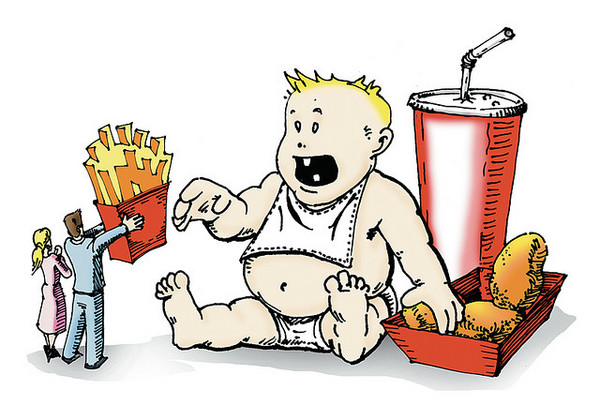The holiday season is upon us and while we prepare to give our children special gifts, it’s important not to give them the gift of contributing to childhood obesity (something they definitely did not ask for and do not want).
The holidays are synonymous with eating traditional, delicious food, but there are ways to still observe tradition and enjoy the holiday without gaining a lot of weight.
The childhood obesity issue
According to the Centers for Disease Control and Prevention, childhood obesity has more than doubled in children and tripled in adolescents in the past 30 years. In 2010, more than one third of children and adolescents were overweight or obese.
While these statistics impose a difficult challenge, a positive change can be made.
„Making lifestyle changes is hard, but it will probably be easier for your kids than for you,“ says Dr. Valentin Fuster, a cardiologist and director of Mount Sinai Heart at Mount Sinai Hospital in New York City. „Don’t put it off or give up. Helping kids form healthy habits is a gift that will benefit them for the rest of their lives.“
Defining obesity
It is important to recognize the difference between „overweight“ and „obese.“ „Overweight“ is defined as having excess body weight for a particular height from fat, muscle, bone, water or a combination of these factors. „Obesity“ is defined as having excess body fat.1 But both are a result of caloric imbalance, too few calories expended for the amount of calories consumed, and are affected by genetic, behavioral and/or environmental factors. Both are cause for concern, especially in young children.
With these definitions in mind, it is also important to note that, just by looking, not all children with extra pounds are overweight or obese. You have to take into consideration body frames and stages of development. A doctor can assist in determining if a child’s weight is a health concern by using growth charts and other tests.
How Obesity Begins
 Obesity can enter a child’s life in many ways.2 The following are the typical factors leading to a child’s risk:
Obesity can enter a child’s life in many ways.2 The following are the typical factors leading to a child’s risk:
- Diet: Regularly eating unnecessary high-calorie foods, including soft drinks, candy and desserts and other foods that are high in sugar and fat.
- Lack of exercise: Children who forgo physical activity and partake in inactive leisure activities (such as watching television and playing video games) will not burn calories obtained by eating unhealthy foods.
- Genetics: If a child is born into a family of overweight people, he or she is more likely to become overweight as well.
- Psychological factors: Children could turn to eating to deal with emotional issues such as stress and depression.
- Socioeconomic factors: Less expensive, long-lasting and easy food options from the grocery store are typically not the healthiest.
Effects on Children
Obesity has both immediate and long-term effects on children3, including:
- More likely to have risk factors for cardiovascular disease, such as high cholesterol or high blood pressure.
- More likely to have pre-diabetes.
- Greater risk for bone and joint problems, sleep apnea, and social and psychological problems (such as poor self-esteem and depression).
- More likely to be obese as adults, making them at risk for heart disease, type 2 diabetes, stroke, cancer and osteoarthritis.
Studies have shown that children who became obese as early as age 2 were more likely to be obese as adults and 50 percent of all adult obesity started in childhood.4 As Mount Sinai’s Dr. Fuster said, it’s important to act early to control the risk of future health problems.
How to Prevent Obesity
 There are numerous steps that can help decrease the likelihood of obesity in a child. These include healthy lifestyle habits, such as diet and exercise. Starting healthy habits early can lower the risk of a child becoming obese and developing related diseases.
There are numerous steps that can help decrease the likelihood of obesity in a child. These include healthy lifestyle habits, such as diet and exercise. Starting healthy habits early can lower the risk of a child becoming obese and developing related diseases.
Healthy eating habits starts at the home, but can also be influenced by schools, the media, the food and beverage industries and entertainment industries. It is important that a child can distinguish between marketing messages and what is actually good for their bodies.
Some other steps to combat childhood obesity:5
- Schedule yearly doctor visits: During a yearly physical, the doctor can measure increases in the child’s height and weight, and calculate their risk of obesity.
- Set a good example: Invite your child to join you as you eat healthy foods and exercise.
- Get them involved in sports: The games they watch on television are even more fun if they participate. Get them involved with local sports teams with their friends, which will help them get outside and partake in physical activity.
- Don’t bargain with food: Using sweets as a reward or declining them as a punishment will only unintentionally lay the groundwork for unhealthy decision making in the future.
- Emphasize the positive: Encouraging your child to play outside and eat fresh foods by explaining the positive benefits of doing so (and not making it look like a chore).
- Be patient: Height plays a factor in measuring obesity, so if your child is still growing, giving them time to do so before jumping to any conclusions.
- Preventing obesity contribution during the holidays
There are numerous ways to ensure you are not contributing to your child’s weight gain and potential obesity during the holidays. Just because we leave a full plate of cookies for Santa Claus on Christmas Eve does not mean we need to eat a full plate of cookies as well!
Here are some tips on how to ensure your children are staying healthy this season:
- Plan ahead: Last-minute food preparations tend to mean unhealthy items. Plan to spend more time preparing meals, getting fresh foods and making meals from scratch to avoid unnecessary byproducts of packaged and frozen goods.
- Portion control: Traditional cakes and cookies are always a family favorite, but that doesn’t mean you need to eat a lot of them. Let your children try one or a small piece of each and they will feel just as satisfied.
- Be a role model: If your children see you eating the vegetables you so carefully marinated and grilled, they will want to also.6
- Update your recipes: This year, why not alter your traditional dessert, perhaps with fruit instead of chocolate. Substitutions will not change the deliciousness of your item, but instead make it a little bit healthier for your family.
- Organize a fun activity: After your meal, have the family play against each other in soccer outside or play charades inside. The activity will help everyone digest and boost energy.7
The holidays are a fun time for the family and it’s easy to be mindful of food and activity choices for our children. A healthy child most often equals a healthy adult, so do your child a favor for their future and work to prevent obesity.
- 1 http://www.nhlbi.nih.gov/health/health-topics/topics/obe/
- 2 http://www.mayoclinic.com/health/childhood-obesity/DS00698/DSECTION=risk%2Dfactors
- 3 http://children.webmd.com/guide/obesity-children
- 4 http://www.nydailynews.com/life-style/health/daily-checkup-addressing-childhood-obesity-early-article-1.1506448
- 5 http://www.mayoclinic.com/health/childhood-obesity/DS00698/DSECTION=prevention
- 6 http://www.todaysdietitian.com/newarchives/110211p22.shtml
- 7 http://www.obesityaction.org/educational-resources/resource-articles-2/nutrition/emotional-and-healthy-eating-during-the-holidays
Photo credit:
Joe_13 / Foter.com / CC BY-ND
noodlepie / Foter.com / CC BY-NC-SA
sherimiya ™¥ / Foter.com / CC BY-NC

















